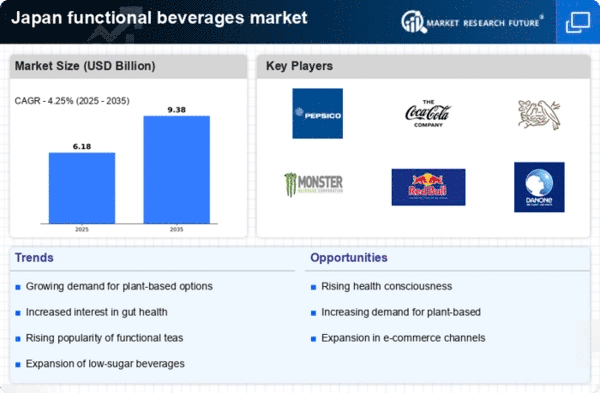Rising Health Consciousness
The increasing awareness of health and wellness among consumers in Japan is a pivotal driver for the functional beverages market. As individuals become more informed about the benefits of nutrition, there is a noticeable shift towards products that offer health benefits beyond basic hydration. This trend is reflected in the growing demand for beverages fortified with vitamins, minerals, and probiotics. According to recent data, the functional beverages market in Japan is projected to grow at a CAGR of approximately 8% over the next five years. This growth is largely attributed to consumers seeking products that support immunity, digestive health, and overall well-being. The functional beverages market is thus witnessing a surge in innovative product offerings that cater to these health-conscious consumers.
Aging Population Demographics
Japan's demographic landscape, characterized by an aging population, significantly influences the functional beverages market. As the proportion of elderly individuals increases, there is a heightened demand for beverages that address age-related health concerns. Functional beverages that promote joint health, cognitive function, and cardiovascular wellness are becoming increasingly popular among older consumers. This demographic shift is expected to drive the functional beverages market, with estimates suggesting that products targeting seniors could account for over 30% of total market sales by 2030. Companies are responding by developing specialized formulations that cater to the unique health needs of this demographic, thereby expanding their market reach.
Innovative Product Development
Innovation plays a crucial role in the functional beverages market, particularly in Japan, where consumers are eager for new and unique offerings. The market is witnessing a wave of creativity, with brands introducing beverages that incorporate exotic ingredients, novel flavors, and functional benefits. For instance, the infusion of adaptogens and superfoods into drinks is gaining traction, appealing to consumers looking for enhanced health benefits. The functional beverages market is thus becoming increasingly competitive, with companies investing in research and development to create products that stand out. This focus on innovation is expected to drive market growth, as consumers are likely to gravitate towards brands that offer cutting-edge solutions to their health and wellness needs.
Digital Marketing and E-Commerce Growth
The rise of digital marketing and e-commerce platforms is transforming the functional beverages market in Japan. As consumers increasingly turn to online shopping for convenience, brands are leveraging digital channels to reach their target audience effectively. Social media campaigns, influencer partnerships, and targeted online advertisements are becoming essential tools for promoting functional beverages. This shift towards e-commerce is expected to drive sales growth, with projections indicating that online sales could account for over 25% of total beverage sales by 2027. The functional beverages market is thus adapting to this digital landscape, enhancing their online presence and optimizing their distribution strategies to cater to the evolving shopping habits of consumers.
Sustainability and Eco-Friendly Practices
Sustainability has emerged as a key consideration for consumers in Japan, influencing their purchasing decisions in the functional beverages market. There is a growing preference for products that are not only beneficial for health but also environmentally friendly. Brands that adopt sustainable sourcing, eco-friendly packaging, and transparent production processes are likely to resonate with the environmentally conscious consumer base. This trend is reflected in the increasing number of certifications and labels that emphasize sustainability. The functional beverages market is thus adapting to these consumer preferences, with many companies committing to reducing their carbon footprint and enhancing their sustainability practices. This shift could potentially lead to a more loyal customer base and increased market share for brands that prioritize eco-conscious initiatives.
















